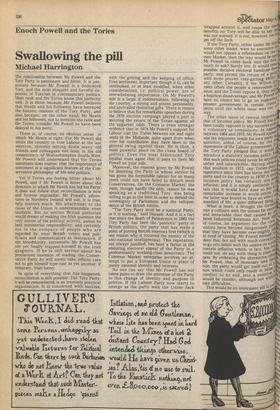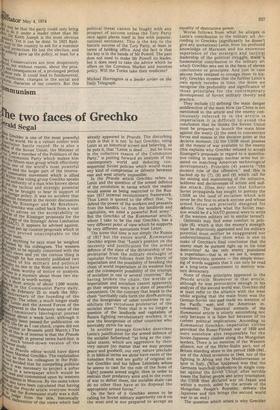Enoch Powell and the Tories
Swallowing the pill
Michael Harrington
The relationship between Mr Powell and the Tory Party is passionate and bitter. It is passionate because Mr Powell is a dedicated Tory, and the most eloquent and forceful exponent of Toryism in contemporary politics. Most rank and file Tories know this perfectly well. It is bitter because Mr Powell believes that Heath and his followers have betrayed the historic mission of the Tory Party, and also because, on the other hand, Mr Heath and his followers, not to mention the rank and file Tories, consider Mr Powell to have been disloyal to his party.
There is, of course, an obvious sense in which Mr Heath is right. For Mr Powell did invite the country to vote Labour at the last election, thereby letting down many old friends and colleagues not least in his old constituency of Wolverhampton South-West. Mr Powell will understand that for Tories sentiment does matter, that the importance of sentiment is a significant feature of the Conservative philosophy of life and politics.
Yet if Tories are feeling bitter about Mr Powell, and if Mr Powell is bitter about the direction in which Mr Heath has led his Party, it does not follow that reconciliation is now and forever impossible. Mr Powell's adventures in Northern Ireland will not, it is true, help matters much. His attachment to the cause of the Union is understandable, even laudable. But no serious British politician would dream of making the Irish question the very centre of his political activity, unless he held ministerial responsibility, and certainly not in the company of people who are regarded by most British voters and politicians and commentators as destructive, if not bloodthirsty, extremists. Mr Powell has not yet finally trapped himself in the Irish quagmire. If he is still serious about his proclaimed intention of leading the Conservative Party he will surely take infinite care not to get himself type-cast as yet another, if honorary, Irish loony.
In spite of everything that has happened, reconciliation is still possible. The Tory Party, it will be remembered, is an intensely practical organisation. It is concerned with success, with the getting and the keeping of office. Even sentiment, important though it is, can be overlooked, or at least modified, when other considerations, i.e. political power, are of overwhelming importance. On Mr Powell's side is a large, if indeterminate, following in the country, a strong and potent personality, and unrivalled rhetorical gifts. There is reason to believe that his remarkable speeches during the 1970 election campaign played a part in securing the return of the Tories against all the apparent odds. There is even stronger evidence that in 1974 Mr Powell's support for Labour cost the Tories between six and eight seats in the Midlands, quite apart from whatever his contribution may have been to the general swing against them. He is then, a most powerful piece on the chess board of politics. Even the most hidebound Tory loyalist must agree that it pays to have Mr Powell on your side.
Moreover, the reasons given by Mr Powell for deserting the Party to whose service he has given his formidable talents for so many years could not have failed to disturb most Conservatives. On the Common Market, the main, though hardly the only, reason he was speaking as a traditional Tory, was being willing to go to the limit in order to defend the sovereignty of Parliament and the independence of the British nation.
"The Tory Party must be a national Party, or it is nothing," said Disraeli. And it is a fact that since the death of Palmerston in 1865 the Tory Party has been the 'patriotic' party in British politics, the party that has made a point of putting British interests first (which is one reason why it incurred the enmity of the anti-national intelligentsia). This reputation, not always justified, has been a factor in the enduring electoral appeal of the Party in a predominantly working-class democracy. The Common Market enterprise involves an attempt to put a European Union in place of purely national identity and interests.
No one can say that Mr Powell has not taken pains to draw the attention of the Party to this change of identity and purpose in politics. If the Labour Party now starts to emerge as the party with the Union Jack
Spectator May 4, wrapped around it, and reaps the electt benefits, no Tory will be able to say th,a, was not warned. It is not, however, too la' i get off the limb. ° If the Tory Party, either under Mr 1-lea1111n some other leader, were to announce t11,0 would not oppose a referendum on the t mon Market, then the way would be 0,61 Mr Powell to come back into the folu', much to ask? Surely not. It would renl° possible decisive electoral handicap fr?.11,1 , 106) party, and permit the return of a P°11' with more proven vote-getting abilItY, u any other. Certainly, if the Wilson ge.:te m ent offers the people a referendum issue, and the Tories oppose it, they ill i 0( a hopeless disadvantage, and Mr PoWel!‘",, have no choice but to go on suPPat.r present government in certain crucla'i pects until the whole issue was out 0' way. The other issue of central importeontc that of incomes policy. Mr Powell has r.,,c been totally opposed to any incomes poil'i it voluntary or compulsory. In (WI; between 1964 and 1970, Mr Powell aPPe'';ri win the argument inside his own partY '''.5 question, aided, of course, by the iill,k„ experience of the Labour government. 'IltiC the Tory Party pledged that it mintlicloi ' introduce a statutory incomes that such policies could never be anYtbill vi unfair and unworkable. Having Oen':io el that position in 1972, can Tories det experience since then has borne out Whtait party said to the country in 1970? A 5°,0 incomes policy has certainly not inflation, and it is simply cretinous tefo, tam that it would have done so but „ remarkable increase in world prices, t'll the latter was bound to have an effect ° standard of life, a quite different thin t What is more, it brought the Govertlo tv into a collision with the unions far rnc'rethe and intractable than that caused bYett fated Industrial Relations Act. Now,''t of course, an argument for the Nne'. unions have become dangerously Pea that they have become over-mighty si`ii in need of taming. Mr Powell hirnseifm`o, deny this, but not with much convict:01i to go into battle with the unions on a Fot, contain inflation which, in fact, has could could not, do any such thing is plainaer find' Mr By embracing the alternative 0,1i'ccal Mr Powell, that of monetary and ia tion, the party would get itself out 0' r tion which could only result in bitteo conflict to no end, into a position 00 would be tenable, although not Witt./ own difficulties. This would be an unpleasant pill to 50 Ili r, e
iii
it
lie
a,
It
el
et
te
0;
at if ,may be that the party could only bring a„:0 do it under a leader other than Mr d'!",(Sir Keith Joseph is the most obvious 1th ti luate). Yet it can be done. In 1923 Baldto the country to ask for a mandate id protection. He lost the election, and .Publicly gave up the iolicy, at least for a "n1 Conservatives are now desperately u, not without reason, about the prosCI Card consequences of, a prolonged period .. our rule. It could lead to fundamental, "Invelcome, changes in the social and Itlie character of our country. But this 1111UniSM



































 Previous page
Previous page